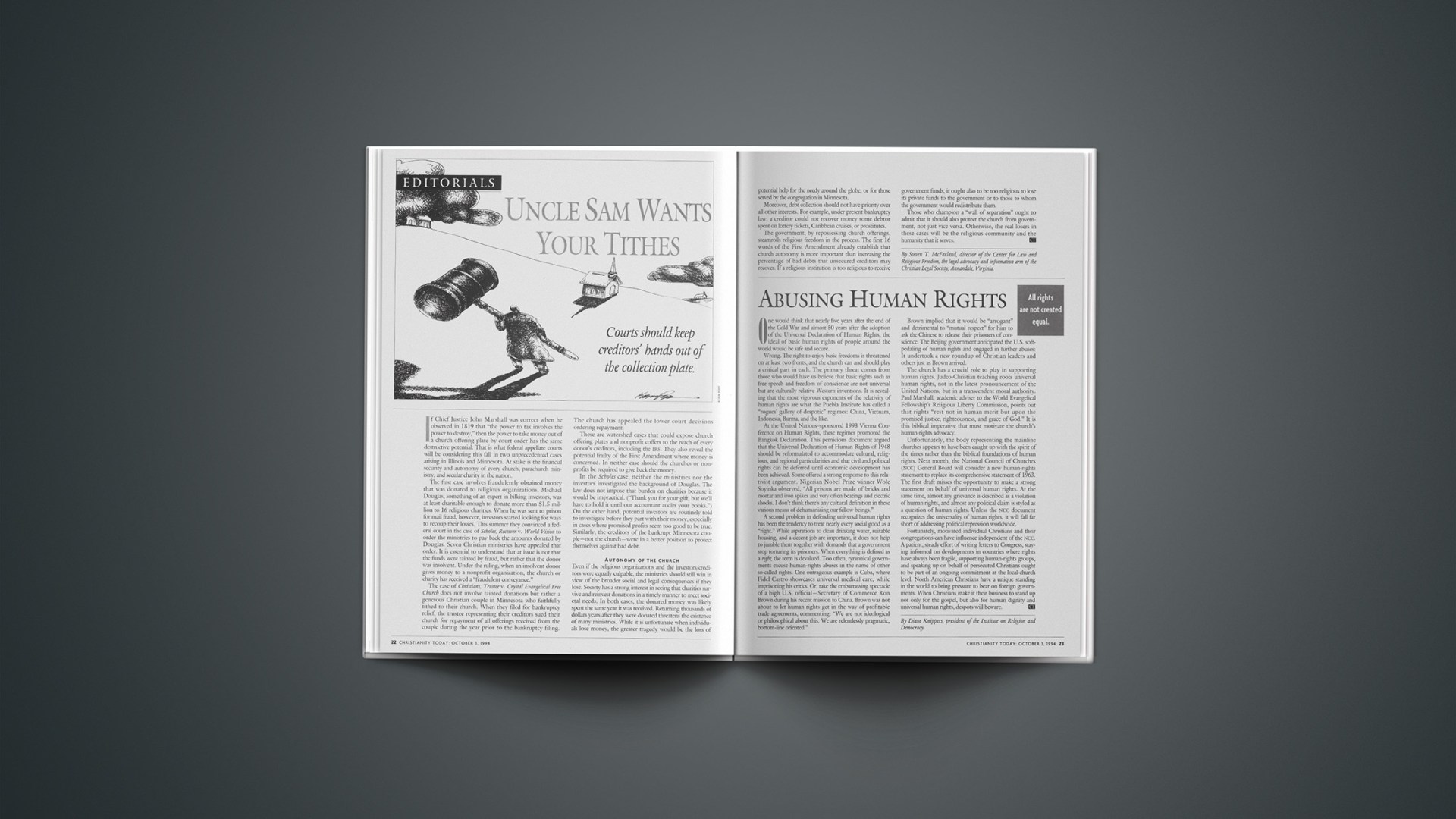If Chief Justice John Marshall was correct when he observed in 1819 that “the power to tax involves the power to destroy,” then the power to take money out of a church offering plate by court order has the same destructive potential. That is what federal appellate courts will be considering this fall in two unprecedented cases arising in Illinois and Minnesota. At stake is the financial security and autonomy of every church, parachurch ministry, and secular charity in the nation.
The first case involves fraudulently obtained money that was donated to religious organizations. Michael Douglas, something of an expert in bilking investors, was at least charitable enough to donate more than $1.5 million to 16 religious charities. When he was sent to prison for mail fraud, however, investors started looking for ways to recoup their losses. This summer they convinced a federal court in the case of Scholes, Receiver v. World Vision to order the ministries to pay back the amounts donated by Douglas. Seven Christian ministries have appealed that order. It is essential to understand that at issue is not that the funds were tainted by fraud, but rather that the donor was insolvent. Under the ruling, when an insolvent donor gives money to a nonprofit organization, the church or charity has received a “fraudulent conveyance.”
The case of Christians, Trustee v. Crystal Evangelical Free Church does not involve tainted donations but rather a generous Christian couple in Minnesota who faithfully tithed to their church. When they filed for bankruptcy relief, the trustee representing their creditors sued their church for repayment of all offerings received from the couple during the year prior to the bankruptcy filing. The church has appealed the lower court decisions ordering repayment.
These are watershed cases that could expose church offering plates and nonprofit coffers to the reach of every donor’s creditors, including the IRS. They also reveal the potential frailty of the First Amendment where money is concerned. In neither case should the churches or nonprofits be required to give back the money.
In the Scholes case, neither the ministries nor the investors investigated the background of Douglas. The law does not impose that burden on charities because it would be impractical. (“Thank you for your gift, but we’ll have to hold it until our accountant audits your books.”) On the other hand, potential investors are routinely told to investigate before they part with their money, especially in cases where promised profits seem too good to be true. Similarly, the creditors of the bankrupt Minnesota couple-not the church—were in a better position to protect themselves against bad debt.
AUTONOMY OF THE CHURCH
Even if the religious organizations and the investors/creditors were equally culpable, the ministries should still win in view of the broader social and legal consequences if they lose. Society has a strong interest in seeing that charities survive and reinvest donations in a timely manner to meet societal needs. In both cases, the donated money was likely spent the same year it was received. Returning thousands of dollars years after they were donated threatens the existence of many ministries. While it is unfortunate when individuals lose money, the greater tragedy would be the loss of potential help for the needy around the globe, or for those served by the congregation in Minnesota.
Moreover, debt collection should not have priority over all other interests. For example, under present bankruptcy law, a creditor could not recover money some debtor spent on lottery tickets, Caribbean cruises, or prostitutes.
The government, by repossessing church offerings, steamrolls religious freedom in the process. The first 16 words of the First Amendment already establish that church autonomy is more important than increasing the percentage of bad debts that unsecured creditors may recover. If a religious institution is too religious to receive government funds, it ought also to be too religious to lose its private funds to the government or to those to whom the government would redistribute them.
Those who champion a “wall of separation” ought to admit that it should also protect the church from government, not just vice versa. Otherwise, the real losers in these cases will be the religious community and the humanity that it serves.
********************
Steven T. McFarland is director of the Center for Law and Religious Freedom, the legal advocacy and information arm of the Christian Legal Society, Annandale, Virginia.
Copyright © 1994 Christianity Today. Click for reprint information.










